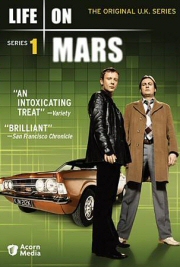- Drama
- 2006
- Buy the DVD
Reviewed by Ross Ruediger
()
here are police dramas that deliver far more engaging procedurals than “Life on Mars.” There are also time travel shows that offer up far more stimulating scenarios than “Life on Mars.” But there’s something about combining the two genres into one that makes you forget about all those other concepts, and leaves you convinced that you’re watching one of the most badass TV series you’ve seen in a good long while. Sam Tyler (John Simm) is a Detective Constable Inspector in 2006, until he’s randomly hit by a car. He’s then suddenly, inexplicably taken back in time to 1973, and the Bowie tune that was playing on his iPod at the time of the accident now plays on an 8-Track deck. His manner of dress has also changed to reflect the times. But most importantly, he’s gone down in rank – he’s now just a lowly Detective Inspector. Is Sam crazy? Has he actually travelled back in time? Or is he in a coma, and this is all some kind of elaborate dream? Most of the evidence suggests the latter.
Sam finds himself working out of the same office, on the watch of DCI Gene Hunt (Philip Glenister), and alongside fellow cops Ray Carling (Dean Andrews) and Chris Skelton (Marshall Lancaster), as well as the lovely Annie Cartwright (Liz White), who quickly becomes his closest confidant, and the only one who might believe his story. But in addition to the fact that the police of the early ‘70s don’t have access to the same techniques that Sam has learned in 2006, his co-workers also manage to be sexist, brutish pigs much of the time. Whether or not this is how cops behaved in ‘73 is irrelevant, because it makes for a fantastic push and pull. While Sam is frequently able to show the team advanced methods and train of thought that lead to cases solved, it turns out that just as often the gut instinct techniques of Gene Hunt work just as effectively.
Much of the season involves a storyline involving Sam’s parents, and there’s a fair amount of drama centering on them, as well as a 4-year-old version of Sam. The real world of 2006 seemingly bleeds through and tries to reach out to him as well – or is 1973 the real world? There’s a great deal of speculation and general all around weirdness going on, and it shows how strong of a man Sam is that he’s able to deal with it all and continue on with his police work at the same time. Over the course of the eight-episode season, Sam and Gene find themselves dealing with fairly typical cases that somehow manage to feel fresh, probably due to the show’s central gimmick; robbery, murder, and even a hostage situation are among the quandaries presented to the duo, and each is given that special “Life on Mars” touch. It’s possible you recall the American remake of the series that lasted for 17 episodes on ABC during the 2008-2009 TV season. I never got around to watching that show, so I can’t offer up a fair comparison, but something tells me the original BBC version trumps it.
The core of the series is the relationship between Sam and Gene, and while Simm is the star of the series, Glenister almost effortlessly steals the show from him scene after scene (although, in all fairness, Hunt is mostly effective only because he has Tyler to clash into). The show has got a wicked sense of humor throughout, and mention must also be made of the rockin’ ‘70s soundtrack. I do not know if every single song that was used in the UK broadcasts is retained for this set, but there certainly are an awful lot of them, including Pink Floyd, Wings, Sweet, T. Rex, Roxy Music, and of course, David Bowie. If Acorn Media, the distributors of this set, had to get music clearance for this stuff, then kudos to them, as it benefits the show’s texture immensely. It may also explain the rather high price tag, but it’s doubtful fans would’ve settled for anything less.
It’s also worth mentioning that when this showed aired on BBC America, it suffered some pretty substantial cuts to make room for commercials (and likely to get rid of some of the more colorful language and some nudity). Each episode on this set clocks in at just a couple minutes under an hour (give or take a minute or two), so if you watched “Life on Mars” on BBC America, you basically missed out on a whole fourth of the series! The show’s second and final season of eight episodes will be released later this year, at which point you can find out what exactly is going on with Sam Tyler, since the Season One finale leaves us hanging, and waiting for more. One thing’s for sure: being a policeman in Manchester of 1973 looks like a hell of a lot more fun than it would be in 2006.
Special Features: There are commentaries for all eight episodes, and they include most of the major stars as well as the behind the camera talent, taking turns from track to track. “Take a Look at the Lawman” is an hour-long documentary (split into two halves on two discs) that’ll pretty much tell you everything you need to know about how “Life on Mars” came to be. There’s also an interview clip with director Bharat Nalluri (who helmed the first two episodes). There are featurettes called “The Music of “Life on Mars’” and “Get Sykes” which included interviews with the composer and production designed respectively. Lastly, there’s an outtakes reel.
You can follow us on Twitter and Facebook for content updates. Also, sign up for our email list for weekly updates and check us out on Google+ as well.













